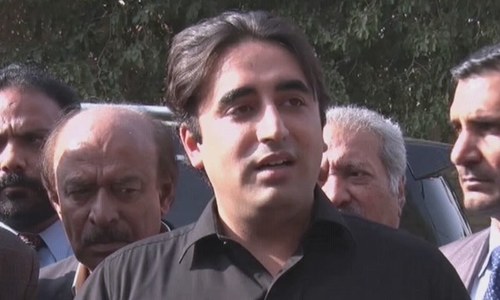ISLAMABAD: The Executive Committee of the National Economic Council (Ecnec) on Monday approved six development projects with a total estimated cost of Rs216.4 billion, including a hefty 47 per cent increase in the cost of Tarbela 4th Extension Project.
The Ecnec meeting was presided over by Adviser to the Prime Minister on Finance and Revenue Dr Abdul Hafeez Shaikh. Majority of the projects approved by committee pertained to the World Bank funding.
The meeting gave a go ahead for the Terbela 4th Extension Hydropower Project with a revised total cost of Rs122.9bn, according to an official statement.
A participant told Dawn that the cost of the project — which has already started power generation — has gone up by more than 47pc to Rs123bn from its previously approved cost of Rs83.6bn.
The cost escalation was caused chiefly by currency depreciation, increased scope of worth and delayed completion.
Rupee depreciation, delay in completion push cost of Tarbela extension up
He said the revision in cost and scope of the project had been done by Wapda authorities without prior approval of the Central Development Working Party or the Ecnec as the original PC-1 approved in August 2012 had expired in January 2017.
Tarbella 4th Hydropower Project has an installed capacity of 1,410 MW. It enhanced the combined generation capacity from Tarbela dam to 4,888MW from 3,478MW.
Under the original plan, the project total cost of Rs83.6bn comprised of Rs65.86bn — 90pc — foreign exchange component (FEC) while the remaining 10pc — Rs17.74bn — were local funds arranged by Wapda.
Under the revised plan, the Rs123bn cost would be financed by the World Bank with $692million or about Rs108bn. The remaining cost has been incurred by Wapda from its own resources.
The Ecnec also approved the Southern Punjab Poverty Alleviation Project (SPPAP) funded by the International Fund for Agricultural Development (IFAD) at a total cost of Rs15.52bn, with Rs7.5bn as the foreign exchange component.
The project is aims to reduce poverty in the Southern Punjab region through improving the living standards of the people, boosting agricultural production and provision of infrastructure such as water supply, irrigation, access roads, sanitation and drainage facilities to the population. The project is expected to be completed by 2023.
The meeting also approved ‘Higher Education Development in Pakistan’ (HEDP) Islamabad, at a total cost of Rs12.08bn. FEC of Rs7.72bn would be provided by World Bank financing. The project has five components including nurturing academic excellence in strategic sectors, supporting decentralised Higher Education Institutes (HEI) for improved teaching and learning, equipping students and HEIs with modern technology, Higher Education Management Information System and data driven services and technical assistance. The project is expected to raise the overall quality of higher education in the country with the use of IT services.
The Ecnec also approved Pakistan Multi-Mission Communication Satellite System (PakSat-MMI) Project with a total cost of Rs39.7bn. It project involves the establishment of Geostationary Communication Satellite and its ground control stations located inside Pakistan, co-hosted with the PakSat-IR ground control equipment.
About 15pc of the project cost would be financed through the Federal Public Sector Development Programme and 85pc would be the Chinese Concessional Loan. The project aims to help increase mobile density, teledensity, broadband internet density, employment generation and quick to establish means of communication over a large geographical area stretching beyond national borders. The project shall be completed in 44 months.
The meeting also approved the Renewable Energy Development Sector Investment Programme (3rd Revised) at a total cost of Rs12.8bn, with Rs8.84bn as FEC. The project shall be sponsored by the Punjab government with financial assistance of the Asian Development Bank (ADB).
The main objective of the project is construction of hydro projects – Marala (7.64 MW), Chianwali (5.38 MW), Deg-Outfall (4.04 MW) and Pakpattan (2.82 MW) – at Canal Falls, Punjab. The project also envisaged capacity building of the provincial Energy Department and additional feasibility studies for construction of hydropower stations in the province.
The ‘Evacuation of Power from Wind power projects at Jhimpir and Gharo Wind Clusters’ was also approved with a revised cost of Rs13.40bn. The project will be executed by the National Transmission and Despatch Company (NTDC).
The main objective of the project is evacuation of 1,256 MW power from the Wind Power Plants (WPPs) installed at Jhimpir and Gharo wind clusters for supply of power to respective load centres of Hyderabad Electric Supply Company. The project shall be financed by KfW of Germany with 27 million euros and NTDC’s own resources. The expected time for the completion of the project is 33 months.
The meeting also took up a report of a committee constituted by Ecnec in July 2019 for the determination of tariff for public sector power projects and approved its recommendations. It noted that “in future all power projects (irrespective of fuel technology) funded through PSDP should comply with Nepra tariff regime by applying to Nepra for tariff determination at feasibility, Engineering, Procurement And Construction (EPC) and Commercial Operation Date (COD) stages after ensuring that the projects have assured funding”.
Published in Dawn, January 7th, 2020















































